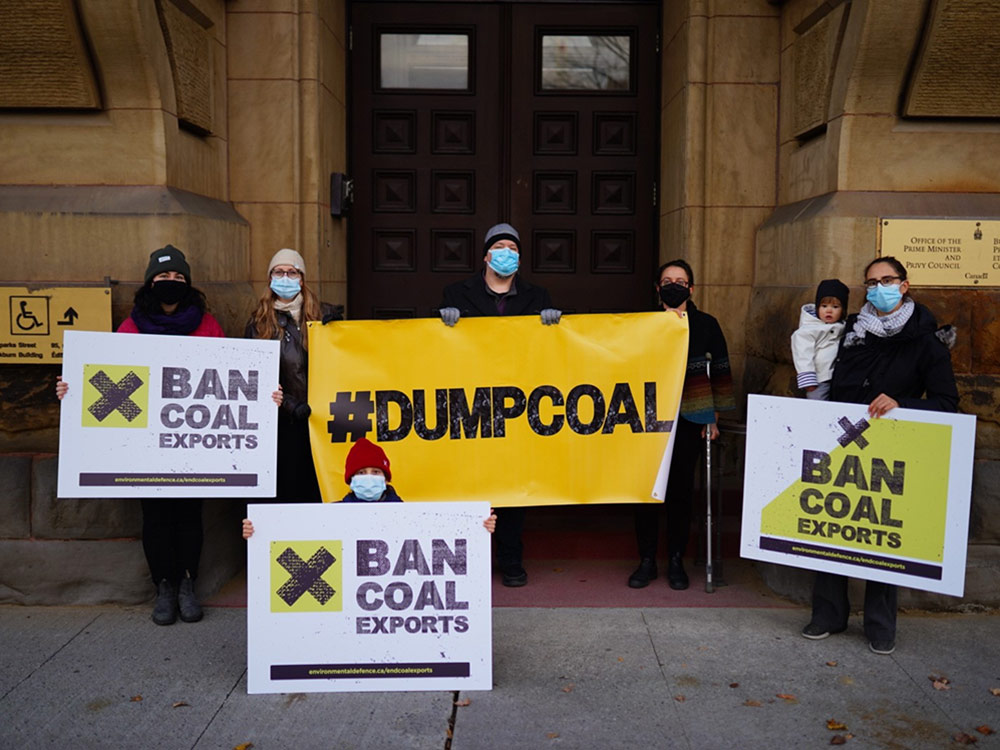Environmental groups are calling on Prime Minister Justin Trudeau to make good on a campaign promise to end thermal coal exports — but more quickly.
On Tuesday, several organizations delivered a petition with 32,200 signatures to Parliament that demands Canada ban thermal coal exports by 2023, instead of 2030. Thermal coal is generally burned to power coal-fired electricity plants, as opposed to metallurgical coal which is burned to produce steel.
This comes as Canadian leaders attend COP26, the United Nations climate summit. Summit president Alok Sharma has said one of the goals of the summit it to “consign coal power to history.”
On Thursday, leaders at COP26 will focus on energy, and federal Minister of Environment and Climate Change Steven Guilbeault will give a speech at an event organized by the Powering Past Coal Alliance, an international coalition focused on transitioning the world away from coal power.
The speech would be a great time for the federal government to announce a ban on thermal coal by 2023, says Julia Levin, senior climate and energy program manager at Environmental Defence, one of the environmental organizations behind the petition.
Other groups include the Canadian Association of Physicians for the Environment, the Council of Canadians, Ecojustice, Keepers of the Water, Leadnow and Stand.earth.
Levin says Canada produces around 60 million tonnes of coal annually, which is split fairly evenly between thermal coal and metallurgical coal. The petition is targeted at thermal coal, not metallurgical.
That’s because there are already alternatives to burning coal for electricity, Levin says, while steel production is still dependent on the fuel.
It’s cheaper, easier, cleaner and more sustainable to produce power from wind or solar than from coal, she says. And it’s been that way for the past five to six years.
But “green steel,” made without burning coal, is relatively new — some of the first ever was produced this summer.
New Brunswick and Saskatchewan are the last two provinces in Canada to burn coal for power, which could end by 2030, pending agreements between the federal and provincial governments, Levin says.
Thermal coal for export is largely produced in Alberta and then shipped through British Columbia’s ports, she says.
Canada exports between 15 to 18 million tonnes of thermal coal annually, but a large chunk of that comes from the U.S., not domestic mines, Levin says.
The number fluctuates, but 10 to 13 million tonnes of U.S. thermal coal are shipped through B.C. ports in a year, along with five to eight million tonnes of Canadian thermal coal, she says.
Canada exports U.S. thermal coal because Washington, Oregon and California have strong environmental regulations that prohibit coal exports, Levin says.
So it’s sent to B.C. by rail for shipment to overseas markets.
Dr. Melissa Lem, a member of the Canadian Association of Physicians for the Environment, says there’s a contradiction between Canada’s positions on what’s safe to use within its borders and fine to ship overseas.
“It’s incredible that Canada is continuing to export thermal coal while acknowledging that it’s too dirty to burn here in Canada,” Lem says. “If it’s too dirty for our southern neighbours, why is it OK for us to ship overseas?”
Phasing out exports by 2030 is moving too slowly to respond to the climate emergency, she says. She points to how nearly 600 people were killed during this summer’s heat wave, which scientists say was caused by climate change.
Beyond climate change, mining, shipping and burning coal can have harmful effects on human health. Lem says exposure to coal dust, from working in coal mines or living near shipping routes or storage facilities, can expose people to silica and mercury. That can impact respiratory health, lead to chronic lung diseases like miners’s lung, and increase risks of cancer, Lem says.
Burning coal releases mercury, nitrous oxides and sulphur dioxides, which can increase people’s risk of heart disease, lung disease, cancer and premature death, she says.
The coastal waters near Westshore Terminals in Delta, B.C., part of the traditional territories of the Tsawwassen First Nation, are a “cesspool of unhealthy fossil fuel pollution,” Lem says. Westshore’s website says it exports more than 33 million tonnes of coal in a year as “Canada’s busiest coal export terminal.”
Coal is shipped in open train cars and stored in large open air heaps at the port, Lem says. That releases coal dust that settles on people’s homes and cars in Delta and the sea near the port, she says.
“Tackling the climate crisis is going to require making some difficult decisions, but banning thermal coal is pretty easy,” says Fraser Thomson, a staff lawyer with Ecojustice who has been working on thermal coal since 2014. “This is mainly U.S. coal, and it’s unpopular with communities,” he says.
He says Canada’s track record in phasing out the mining and use of thermal coal has been “commendable,” and “matched its international rhetoric.”
But the country continues to export thermal coal, which is “fundamentally incompatible with its leadership in the Powering Past Coal Alliance, and because we all know the atmosphere doesn’t care where carbon is emitted,” Thomson says.
He adds Canada’s thermal coal exports create around 32 million tonnes of carbon dioxide emissions when they are eventually burned for power.
A thermal coal ban would create problems for people who work in coal power plants or mines.
Anticipating this, the federal government created a 2019 task force to map a just transition for coal workers and communities. Ports like Westshore Terminal, owned by the Jim Pattison Group, are already planning for a thermal coal ban.
The Tyee asked the Ministry of Environment and Climate Change Canada and the Prime Minister’s Office for comment, but did not hear back by press time. ![]()
Read more: Energy, Local Economy, Federal Politics, Environment
















Tyee Commenting Guidelines
Comments that violate guidelines risk being deleted, and violations may result in a temporary or permanent user ban. Maintain the spirit of good conversation to stay in the discussion.
*Please note The Tyee is not a forum for spreading misinformation about COVID-19, denying its existence or minimizing its risk to public health.
Do:
Do not: